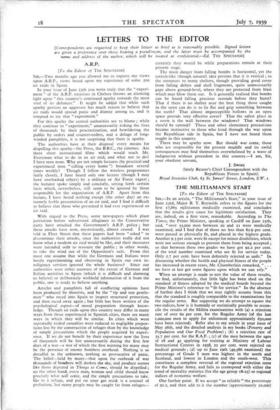LETTERS TO THE EDITOR
[Correspondents are requested to keep their letters as brief as is reasonably possible. Signed letters are given a preference over those bearing a pseudonym, and the latter must be accompanied by the name and address of the author, which will be treated as confidential.—Ed. THE SPECTATOR]
A.R.P.
[To the Editor of THE SPECTATOR] SIR,—TWO months ago you allowed me to express my views upon A.R.P., views based upon my experience of some zoo air raids in Spain.
In your issue of June 23th you write truly that the " experi- ment " of the A.R.P. exercises in Chelsea throws an alarming light upon " this country's continued apathy towards the most vital of its defences." It might be added that while such apathy persists an aggressor has much reason to believe that air raids would spread panic and dismay among us, and is tempted to try that " experiment."
For this apathy the central authorities are to blame ; while they continue to " experiment," unnecessarily risking the lives of thousands by their procrastination, and bewildering the public by orders and counter-orders, and a deluge of long- winded pamphlets, it is not surprising that there is apathy.
The authorities have at their disposal every means for dispelling this apathy—the Press, the B.B.C., the cinemas. Are there short instructional films which would teach Mr. Everyman what to do in an air raid, and what not to do? I have seen none. Why are not simple lectures (by practical and experienced men " calling every home ") broadcast several times weekly? Though I follow the wireless programmes fairly closely, I have heard only one lecture (though I may have overlooked others) by a military or Air Force expert ; the lecturer spoke simply and concisely, setting forth certain facts which, nevertheless, still seem to be ignored by those responsible for the organisation of A.R.P. Apart from this lecture, I have heard nothing except (the other day) an ex- tremely feeble presentation of an air raid, and I find it difficult to believe that those who presented it had ever experienced an air raid.
With regard to the Press, some newspapers which place patriotism before subservient allegiance to the Conservative party have attacked the Government's A.R.P. policy ; but these attacks have now, mysteriously, almost ceased. I was told in Fleet Street that these papers had been " asked " to discontinue their attacks, since the authorities really did not know what a modem air raid would be like, and their measures were intended only to reassure the public ; in other words, to take the wind out of the Opposition's sails. From this must one assume that while the Germans and Italians were busily experimenting and observing in Spain our own in- telligence services ignored the whole business? Since our authorities were either unaware of the extent of German and Italian activities in Spain (which it is difficult and alarming to believe) or deliberately withheld information of it from the public, one is ready to believe anything.
Articles and pamphlets full of conflicting opinions have been produced by theorists, and by the " tip and run gentle- men " who raced into Spain to inspect structural protection, and then raced away again ; but little has been written of the psychological aspect—of moral preparation through know- ledge. Though air raids upon this country may differ in many ways from those experienced in Spanish cities, there are many ways in which they will be similar. In cities which were repeatedly raided casualties were reduced to negligible propor- tions less by the construction of refuges than by the knowledge of simple precautions which the people acquired by experi- ence. If we do not benefit by their experience now the lives of thousands will be lost unnecessarily during the first few days of a war—a war of which the first warning for many may be the presence of enemy bombers overhead. Nothing is so dreadful as the unknown, nothing so provocative of panic. The belief—held by many—that upon the outbreak of war thousands of bombers will darken the sky, and produce scenes like those depicted in Things to Come, should be dispelled ; cm the other hand, every man, woman and child should know precisely what will come, and the simple precautions to take. Go to a refuge, and put on your gas mask is a counsel of perfection, but many people may be caught far from refuges—
certainly they would be while preparations remain at their present stage.
The main danger from falling bombs is horizontal, yet the ostrich-like (though natural) idea persists that it is vertical ; so the entrances to many shelters, though providing good cover from falling debris and shell fragments, quite unnecessarily gape above ground-level, where they are protected from blast which may blow them out. Is it generally realised that bombs can be heard falling precious seconds before they burst? That if there is no shelter near the best thing those caught in. the open can do is to lie flat and grip something between the teeth? That almost imperceptible hollows in an open space provide very effective cover? That the safest place in a room is the wall between the windows? That windows should be ()lamed? These and other elementary precautions became instinctive to those who lived through the war upon the Republican side in Spain, but I have not heard them taught in this country.
There may be apathy now. But should war come, those who are responsible for the present muddle and its awful consequences may find themselves overwhelmed by a wave of indignation without precedent in this country.—I am, Sir, your obedient servant,
J. SWIRE
(lately Reuter's Chief Correspondent with the Republican Forces in Spain).
Royal Societies Club, 63 St. lames' Street, London, S.W. I.










































 Previous page
Previous page